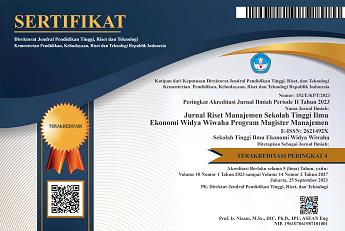PENGARUH KEPEMIMPINAN TRANSFORMASIONAL, KOMITMEN ORGANISASI DAN KEPUASAN KERJA TERHADAP KINERJA KARYAWAN
(Studi pada Puskesmas Kalibawang, Kabupaten Kulon Progo)
DOI:
https://doi.org/10.32477/jrm.v5i1.37Keywords:
Leadership Style, Organizational Commitment, Job Satisfaction And Employee PerformanceAbstract
The purpose of this study is to examine the effect of transformational leadership, organizational commitment, and job satisfaction on employee performance at Puskesmas Kalibawang, Kulon Progo. This research is a causal associative with quantitative approach. The data obtained by primary data using questionnaire method. Hypothesis testing in this reasearch are multiple linear regression analysis, F-test and T-test used to examined research model and determine the effect of independent variables to the dependent variable. The results showed a positive and significant effect of transformational leadership, organizational commitment, and job satisfaction on employee performance (sig. 0,000 less than 0.05). T-test showed no effect of transformational leadership on employee performance (sig. 0,844 greather than 0,05). Organizational commitment has positive and significant effect on employee performance (sig. 0,011 less than 0,05) and job satisfaction also have positive and significant effect to employee performance (sig. 0,032 less than 0,05).
References
Bass, B.M., Avolio, B.J., Jung, D.I. & Berson, Y., (2003), Predicting Unit Performance by Assessing Transformational and Transactional Leadership, Journal of Applied Psychology,Vol. 88, No. 2, pp. 207-218.
Bono, J.E. & Judge, T.A. (2003). Self-Concordance at Work: Toward Understanding the Motivational Effects of Transformational Leaders, Academy of Management Journal, Vol. 46, No. 5, pp. 554-571.
Cavazotte, F., Moreno, V., & Bernardo, J. (2013), Transformational Leaders and Work Performance: The Mediating Roles of Identification and Self-efficacy, BAR - Brazilian Administration Review, Vol. 10, No. 4, Art. 6, pp. 490-512.
Cooper, R. Donald & C. William Emory (2006), Metode Penelitian Bisnis, Jilid 1 Edisi Kelima, Penerbit Erlangga.
Franco, M. & Franco, S. (2017), Organizational Commitment in Family SMEs and its Influence on Contextual Performance, Team Performance Manage- ment: An International Journal, Vol. 23 Issue: 7/8, pp.364-384.
Ghozali, I. (2005), Aplikasi Analisis Multivariate dengan Program SPSS, Semarang: Badan Penerbit Universitas Diponegoro.
Gomes, Faustino C (1995) Manajemen Sumber Daya Manusia, Andi Offset, Yogyakarta.
Haftkhavani, Z.G., Faghiharam, B., & Araghieh, A. (2012), Organizational Commitment and Academic Performance (Case study: students at secondary schools for girls), Procedia - Social and Behavioral Sciences 69, pp.1529 – 1538.
Harrison, D. A., Newman, D. A., & Roth, P. L. (2006). How Important are Job Attitudes? Meta-Analytical Comparisons of Integrative Behavioral Outcomes and Time Sequences. Academy of Management Journal, 49, pp. 305"325.
Humphreys, J.H. (2002), Transformational Leader Behavior, Proximity and Successful Services Marketing, Journal of Services Marketing, Vol. 16, No. 6, pp. 487-502.
Jyoti, J., & Bhau, S. (2016), Transformational Leadership and Job Performance: A study of Higher Education, Journal of Services Research, Vol. 15, No. 2.
Kensbock, J.M., & Boehm, S.A. (2016), The Role of Transformational Leadership in the Mental Health and Job Performance of Employees with Disabilities, The International Journal of Human Resource Management, Vol. 27, No. 14, pp. 1580–1609.
Keputusan Menteri Pendayagunaan Aparatur Negara Nomor: KEP/ 25 / M.PAN/ 2 /2004 tentang Indeks Kepuasan Masyarakat.
Khan, A., Masrek, M.N., & Nadzar, F.A. (2015), Analysis of Competencies, Job Satisfaction and Organizational Commitment as Indicators of Job Performance: A Conceptual Framework, Education for Information 31, pp. 125– 141.
Kinicki, A., Kreitner, K., Sinding, K. & Waldstrom, C. 2014. Organisational Behaviour, London: McGraw-Hill Education.
Lund, D.B. (2003). Organizational Culture and Job Satisfaction, Journal of Business & Industrial Marketing, Vol. 18 Iss: 3, pp.219 – 236
Luthans, F. (2011). Organizational Behavior: An Evidence-Based Approach, 12th edition, McGraw-Hill Education.
Magister Manajemen Widya Wiwaha (2016), Buku Pedoman Tesis, Yogyakarta: Magister Manajemen Widya Wiwaha.
Mahmudi (2005), Manajemen Kinerja Sektor Publik, Akademi Manajemen Perusahaan YKPN.
Mangkunegara, A.A & Prabu, A., (2000), Manajemen Sumber daya Manusia Perusahaan, Bandung: Remaja Rosda Karya.
Mas’ud, F. (2004), Survai Diagnosis Organisasional (Konsep dan Aplikasi), Semarang: Badan Penerbit Universitas Diponegoro.
Mathis, R.L & Jackson, J.H. (2001), Manajemen Sumberdaya Manusia, Buku 1, Salemba Empat Jakarta.
Morrow, P.C., McElroy, J.C. & Blum, M. (1988), Work Commitment among Departement of Transportation Employees, Review of Public Personnel Administration, Vol. 8, No.3, pp.96-104.
Nurjanah. (2008), Pengaruh Gaya Kepemimpinan dan Budaya Organisasi terhadap Komitmen Organisasi dalam Meningkatkan Kinerja Karyawan (Studi pada Biro Lingkup Departemen Pertanian), Tesis Program Pasca Sarjana Magister Manajemen Universitas Diponegoro.
Ostroff, C. (1992), The Relationship between Satisfaction Attitudes and Performance an Organization Level Analysis, Journal of Applied Psychology. Vol. 77. No. 68. p. 933-974.
Patiar, A. & Wang, Y. (2016), The Effects of Transformational Leadership and Organizational Commitment on Hotel Departmental Performance, International Journal of Contemporary Hospitality Management, Vol. 28 Issue: 3, pp. 586- 608.
Peng, Y.P. (2014). Job Satisfaction and Job Performance of University Librarians: A Disaggregated Examination, Library & Information Science Research 36, pp. 74–82.
Peraturan Mentri Kesehatan Republik Indonesia No. 75 Tahun 2014 tentang Pusat Kesehatan Masyarakat.
Pradhan, S., & Pradhan, R.K. (2015), An Empirical Investigation of Relationship among Transformational Leadership, Affective Organizational Commitment and Contextual Performance, Vision 19(3), pp. 227–235.
Prawirosentono, Suryadi (1999), Kebijakan Kinerja Karyawan, Yogyakarta: BPFE.
Rakhmat Nugroho (2006), Analisis Faktor- Faktor Yang Mempengaruhi Kinerja Karyawan (Studi Empiris pada PT. Bank Tabungan Negara (Persero), Cabang Bandung), Tesis Program Pasca Sarjana Magister Manajemen Universitas Diponegoro.
Rani Maryam (2009), Pengaruh Gaya Kepemimpinan dan Budaya Organisasi terhadap Kinerja Karyawan melalui Kepuasan kerja karyawan sebagai variabel intervening pada Kantor Pusat PT Asuransi Jasa Indonesia (Persero), Tesis Program Pasca Sarjana Magister Manajemen Universitas Diponegoro.
Ratnawati, Intan (2012), Analisis Pengaruh Budaya Organisasi dan Kepuasan Kerja terhadap Komitmen Organisasional dalam meningkatkan Kinerja Karyawan (Studi pada PT. Sido Muncul Kaligawe Semarang), Jurnal Bisnis dan Ekonomi (JBE), Vol. 19 No. 2, September 2012, hal 170 – 187.
Rivai, Veithzal (2004), Kepemimpinan dan Perilaku Organisasi, Edisi Kedua, Jakarta: PT Rajagrafindo Persada.
Robbins, S.P. & Judge, T.A. (2008), Perilaku Organisasi, Edisi 12 Jilid 1 dan 2, Jakarta : Salemba Empat.
Robbins, Stephen P., (2006), Perilaku Organisasi, Jakarta: PT Indeks Kelompok Gramedia.
Siagian, Sondang.P (2000), Manajemen Sumber Daya Manusia, Jakarta: Penerbit Bumi Aksara.









